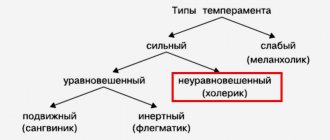Hello to all readers! Lyudmila Redkina is in touch. Perhaps you have met among your acquaintances people who are the life of the party, constantly in the center of attention in small talk, but as soon as they are left alone with themselves, “you can’t pull them out of there by the ears.” I have several good friends around me with similar behavior. I always wondered how this could be: if a person is an introvert, he cannot be so sociable and open, but if he is an extrovert, he will always be ready to communicate and will not protest against it. But there is a third psychotype that was identified relatively recently - ambivert. In the article we will look at who an ambivert is, how it manifests itself, and how to recognize it among other psychotypes.
Definition
In simple terms, an ambivert is a person who exhibits both introvert and extrovert behavior. These people can be both very sociable and quiet. They are characterized by an almost miraculous transformation from a lone wolf doing some kind of work into the highlight of the team. The meaning of the word “ambivert” shows that there are two types of behavior (ambi – both).
Such individuals fit very harmoniously into any society, any conditions. They prefer solitude to long-term communication, as they get tired of it, and active spending of time to long periods of loneliness.
And by the way, Wikipedia says that most people are ambiverts. Well, this is not surprising, life dictates its own rules to us, where we must be sociable, work in a team, along with solitude and the desire to sometimes be alone. Although the American psychologist R.R. Macker showed in his research that only 38% of people are ambiverts.
Ambivert is between extrovert and introvert
Pros and cons of the psychotype
The main advantage of ambiverts is their flexibility and ability to adapt to different situations. This makes them effective in all areas of life. They embody the “golden mean” between extroverts and introverts, possessing the strong qualities of both.
According to a study described in the journal Psychological Science, people of this type achieve higher performance even in areas that have always been considered the domain of extroverts, such as sales. In three months, ambiverts managed to make more sales than representatives of other psychotypes.
This is explained by the fact that they are moderately persistent, but not aggressive, and can adapt to the client’s characteristics. They understand both extroverts and introverts well, so they can easily find persuasive words for each.
Another undeniable advantage of ambiverts is their independence. They are self-sufficient and self-confident. Communication brings them pleasure, but they can do without it. Very often situations arise when people are drawn to an ambivert more than he is drawn to them.
Representatives of this psychotype spend energy rationally. In situations of high energy, they usually turn on the extrovert mode, and in moments of decline they switch to the introvert mode. This allows them to always be on their toes.
Despite the general psychological well-being of this type, it also has disadvantages:
- Fatigue from social contacts. It is difficult for representatives of this psychotype to act as extroverts for a long time. It happens that from overwork they “withdraw into themselves” right in the midst of a noisy party. People around you begin to be perplexed and ask what happened. But ambiverts themselves cannot answer this question. They just suddenly suddenly lost the mood to have fun.
- Difficulty taking initiative. Ambiverts do not like to initiate communication. They are accustomed to the fact that people themselves strive to communicate with them, so they rarely call or write first. If no proposals are received for a long time, they begin to experience loneliness.
- Excessive sacrifice. Such people are distinguished by their responsiveness, kindness and altruism. They are deeply imbued with the problems of other people and sincerely try to help. Everything would be fine, but often this happens to the detriment of their own interests.
- Self-confidence. Ambiverts are everyone's favorite people. Many people want to communicate with them and express sympathy. In this regard, they may grow a crown, from under which they will look down on people.
Advantages and disadvantages
There is a lot of research into two energy behaviors: introverts and extroverts. Some psychologists view these concepts as two ends of a continuum of energy. Ambiverts are in the middle, they combine these polar types depending on the situation.
It is generally accepted that our society prefers sociable, flexible people, that is, extroverts. But research by Daniel Pink (the book “Selling Comes Natural to Us”) has proven that this conclusion is wrong. European and American buyers have shown that they are annoyed by the intrusiveness and assertiveness of extroverted salespeople. In simple terms, buyers prefer ambivert salespeople.
This is confirmed by statistics: as a result of this study, introverts earned an average of 120 dollars, extroverts - 125, and ambiverts - 155 dollars per hour.
Why is this happening? Because people with this psychotype can adapt to the situation: they do not impose themselves, but they are not silent, like fish. Therefore, it is difficult to talk about the shortcomings of this psychotype, because everything depends on the specific situation and the person’s energy exhaustion. If it is depleted, you will get the disadvantages of an introvert. If an ambivert is on the rise, you will see the benefits of being an extrovert.
Among the common shortcomings of such individuals, there is increased sacrifice, which sometimes prevents a person from making time for himself. They also tend to show noticeable excess self-confidence if they succeed in some matter. This is very annoying for people nearby, especially when they have an envious worm inside them!
How to tell if you're an ambivert
According to recent data, 40% of the world's population are ambiverts. Therefore, there is a high probability that you belong to this type. Look out for the following signs:
- The anticipation of a new experience gives you pleasant excitement. Change does not frighten ambiverts like introverts, but it is not a strong need like extroverts. Stress from meeting new people and from a change of environment is present, but not very pronounced.
- You sometimes like to be the center of attention, but you cannot be called the life of the party. Joking and expressing their opinions in a general discussion is not difficult for ambiverts, but they also feel comfortable in the role of a listener and an outside observer.
- You think about your thoughts before you voice them. Extroverts pour out their thoughts without filtering them, introverts wander in the labyrinths of their reflection before saying anything, and ambiverts clearly formulate a thought first in their heads and then verbally.
- You are a fairly open person, but there are things you don’t tell anyone about. You are happy to share your thoughts, experiences, and views on life with people. But you don’t trust anyone with your most secret things.
- You are almost never bored. In the company of people, ambiverts are absorbed in communication, and when alone they engage themselves in some kind of activity.
- You are not characterized by excessive vulnerability. Unlike introverts, ambiverts are not overly sensitive. Sensitive - yes, but not vulnerable. You don’t dwell on your experiences and don’t worry about problems.
- It is difficult to unbalance you. People of this type are characterized by emotional stability, so in difficult situations you demonstrate restraint and self-control.
If you are still in doubt, take a look at our article on how to determine your personality type. In it you will find many interesting tests, including ones to determine your psychotype. They will help you find answers, rather than suffer from guesswork.
Signs
Since an ambivert can be different, its characteristics are blurred. But there are some features of the behavior of such people that will accurately indicate to you that this is none other than an ambivert:
- Perestroika. Has the ability to quickly and easily change from an extrovert to his antipode. Can also easily transition from being withdrawn to being sociable.
- Intuition. He has excellent intuition, thanks to which he selects the right friends.
- Comfort. He feels comfortable around people, and also when he is completely alone.
- Polarity. This personality type can combine an active interlocutor and an expert in various topics along with complete inaction in the conversation, especially when feeling the insincerity of the interlocutor.
- Different look. Surprisingly, some people will think you're an energetic goofball if you're an ambivert. But it will still seem to others that you are an incorrigible quiet person!
- Compassion. If you are the owner of this psychotype, you will pay attention to people’s problems, empathize, provide support in difficulties, this is what attracts many people to you.
- Approach to everyone. You are able to find common interests and topics with almost everyone, an approach to conversation, and skillfully use external and internal energy, like an extrovert.
- Divergent thinking. Often such employees are distinguished by creativity and an unconventional approach to solving problems. They have developed divergent thinking, when they can come up with several options for the development of events for one situation. A divergent is always valued in professional activities.
And in what industries can an emotionally stable ambivert achieve maximum success?
Character traits
I know firsthand what an ambivert is. Before my eyes there is a vivid representative of this psychotype - my father. For more than 10 years now he has been living alone in a quiet, calm town. Loneliness does not cause him any discomfort: he does not get bored, does not feel sad, and does not suffer from idleness. And when he gets into a company of people at family holidays or meetings of friends, he easily becomes the life of the party. He has an incredible gift of eloquence - people listen to his stories with their mouths open.
Dad is often invited to various events and gatherings of people, and he has the opportunity to choose: break his seclusion and join a noisy company, or spend time at home with a book in his hands.
So that you can better understand the essence of this psychotype, let's look at all its characteristic features.
- Flexibility
An ambivert easily adapts to any situation. Do you need to organize and hold an event for a large number of people? No problem please. Spend a week on a desert island? And it's easy. He feels relatively comfortable in any conditions.
- Wide circle of friends
An ambivert has many friends and acquaintances. He easily gets along with new people and establishes trusting contacts - in this he is similar to an extrovert. But while an extrovert may not have any close bosom friends at all, an ambivert will definitely have a couple. He needs deep trusting communication and moral support.
- Conflicting opinions about him from friends
People describe an ambivert in different ways, depending on which side they see him as. Moreover, the descriptions can be completely opposite. To some he seems serious and reserved, while to others he seems cheerful and reckless. Many people are perplexed how such different traits can coexist in one person.
- Good empathy
Ambiverts inherit this quality from introverts. They are characterized by emotional sensitivity, the ability to empathize, and psychological sensitivity. They literally read a person’s emotions and easily recognize lies and manipulation.
- Ability to find an approach to everyone
Ambiverts can find common ground with completely different people. They are not self-obsessed, are sincerely interested in others, are able to listen carefully and tell interesting stories. People are drawn to them and strive to get closer, but they are not ready to accept everyone into their narrow circle of friends. But they can communicate in a friendly manner with everyone.
- Well-developed intuition
This psychotype has a highly developed sixth sense. Ambiverts know how to listen to themselves and perceive signals from the world around them. Intuition helps them make the right decisions.
- Creative thinking
A template and stereotypical view of things is not about ambiverts. They can look at the world from different points of view and find non-standard solutions in standard situations. At work, such employees are generators of creative ideas, for which they are especially valued by their superiors.
Suitable professions
Every person is constantly looking for his place in the sun.
Finding a job as an adult is the most important thing to provide for your needs. No matter what type of person a person is, even if he is an introvert a hundred times over, he still needs to earn his “piece of bread.” To combine business with pleasure, earn money while enjoying work, let’s see which professions are suitable for ambiverts. The list of suitable professions for people with this psychotype can be written for a long time. After all, they, like chameleons, in the good sense of the word, can adapt to the surrounding conditions. Ambiverts can achieve success in their work in the following professions:
- Exchange workers. Brokers who understand the client and sell securities profitably are very important in closing important transactions. People with this psychotype are the best suited for this job. What is important here is concentration, acumen, pushing through interests along with respect for others.
- Social workers. Women with the characteristics of an introvert and an extrovert at the same time find an excellent approach to all their charges. They are also helped by inner endurance and mastery of emotions. They treat people understandingly and interact positively with those in need.
- Organizers and presenters of events. Choleric and sanguine ambiverts do an excellent job of creating a fuss. If this is a full-time employee of the company, you will not regret if you appoint him responsible for organizing the corporate event. Also, such people find their clients in the role of toastmaster, agency for decoration and organization of holidays.
- Resellers. These are sales agents, realtors and other intermediaries who advertise a product or are responsible for a transaction. They can persuade anyone, unobtrusively force them to buy or oblige them to conclude a deal.
- Diplomats, politicians. Well, there’s no need to talk about the importance of ambiverts in these positions. In addition, observations have shown that ambiverts-normosthenics achieve the greatest success in their activities. These are people with leadership qualities, they strive to achieve goals and win competition with anyone. Capable of attracting attention and winning the sympathy of the public.
- Medical practitioners. There is no need to even say that the medical profession is one of the most stressful of the entire list of professions. A good doctor is a person characterized by high stress resistance, compassion, empathy, insight and other traits. The listed characteristics belong specifically to the average psychotype.
- Athletes. Having a stable nervous system and determination, such individuals can achieve great success in sports. By the way, it will be good if, for sports activities, you develop the work of both hands equally - you become ambidextrous. In combat sports, rowing, tennis, equally strong work of both hands will give you an advantage over your opponent.
- Copywriters and editors. Some people are sure that remote work is only for introverts, but no! The “Golden Mean” also feels good in this role. In such work, these people find fulfillment and also enjoy success, because their speed and quality of work will delight any customer!
But remember: no matter who your psychotype is, even Charlie Chaplin himself, this is just your feature, a characteristic. It should not be higher than your desires and goals. In the end, you create your own destiny and my recommendations for suitable professions are only a slightly open window in finding yourself.
What activities are suitable for an ambivert?
We can say that absolutely any activity is suitable for an ambivert. But there are types of jobs that are best suited for them.
Activities suitable for an ambivert should not be monotonous and monotonous. It should involve a change of environment, working in different conditions, traveling to distant cities should be replaced by classes in a warm, comfortable office or room.
Many creative professions seem to be specifically designed for ambiverts. For example, a musician. For some time he composes works, being completely alone, then he practices them, rehearsing as part of his team, and then performs in front of the public. This may be followed by an interview, signing of autographs, and after that a return to the studio. The environment, operating conditions, and the number of people around are constantly changing, and this is what an ambivert needs.
Another suitable industry for people of this type is the service industry; At the same time, an ambivert will show himself best where constant and short-term contacts with people are necessary: he can be a recruiting manager, the head of a small company, a social worker, or an intermediary in concluding deals.
Psychologist Adam Grant conducted extensive research that showed that it is not extroverts or introverts who do best in trading, but ambiverts. For example, they showed the highest percentage of successful sales. According to the psychologist, this became possible thanks to the ability of ambiverts to analyze the situation, act in accordance with the situation and apply an individual approach to clients.
In general, it can be rightly argued that the pace of modern life is more suitable for such people, and not for charismatic extroverts or eternally reserved introverts.
Of course, despite the positive characteristics and advantages of the ambivert personality type, it also has certain weaknesses. For example, great success in various areas of life leads to excessive self-confidence. An even more dangerous trait of ambiverts is excessive sacrifice, when the desire to devote their lives to others suppresses personal interests.
How to communicate with ambiverts
The description of this personality type helps to understand the lion's share of our acquaintances. Knowing their characteristics, you can be more lenient about the time when they need a little privacy. So don’t pester them with constant “AU!” on social networks if they don’t respond, and also don’t drag them out to different parties when they don’t need it.
Such individuals sense manipulation very subtly. Mothers of adult ambiverts should not attract a lot of the child’s attention by complaining about loneliness or a bad life. This will only worsen the relationship. It’s better to tell us right away what you need, how much and when!
Show interest in the individual and do not insist on your monologue when communicating. Such people do not like it when their opinion is not valued. This is not an introvert for whom the topic of conversation and your “basics” are not important - they still think about their own things! Ambiverts understand the essence of your speech, but if it is not interesting, expect a parry and a sharp “Bye!”
To learn how to get along with people, you can undergo special training.
The online intensive “Effective Communication” is suitable for:
- Entrepreneurs, executives, top managers.
- For those who work with clients, middle managers, and freelancers.
- To everyone who is involved in raising children.
- Anyone who wants to improve their communication with others.
The author of the course is Oleg Kalinichev, an expert in nonverbal behavior, emotional intelligence and lie detection. Accredited trainer Paul Ekman International. Managing Director of Paul Ekman International in Russia (PEI Russia).
You will learn:
- Communicate with closed people.
- Coping with daily problems involving other people.
- Influence your environment and much more.
The course lasts 1 month and contains 33 video lectures, 26 exercises, 6 tests + webinars with emotional intelligence experts.
The training consists of 4 blocks:
- Emotions. Basics.
- Emotional stability and emotional flexibility.
- Social efficiency.
- Building harmonious relationships.
How it goes:
- You are watching video lectures.
- Then you complete independent tasks to reinforce the material.
- Participate in webinars and discuss difficult issues.
- Take tests on the material you have studied.
- You complete the intensive course and receive a certificate.
The cost of completing it independently is 1,040 rubles, with a curator – 2,370 rubles.
They will refund your money if you decide within 7 days that the course is not suitable for you.
Comparison of an ambivert with an extrovert and an introvert
It is important to note that none of the psychotypes are better or worse than others, they are just different. The traits and behaviors of extroverts, ambiverts, and introverts certainly differ. These differences are presented in the comparison table below.
| Extrovert | Ambivert | Introvert |
| Likes to spend a lot of time with other people | Likes to spend time in company, but also needs privacy | Likes to spend time alone |
| Communicative | Sociable in the right conditions | Restrained |
| Works well in a team | Works both in a team and independently | Prefers to work individually |
| Looks for solutions and sorts things out through communication | Uses communication as well as internal analysis and reflection | Prone to self-reflection |
Along with extroverts, ambiverts and introverts, you sometimes hear about divergents and convergents. However, these concepts are not from the same category.
Introversion and extraversion serve as indicators of the severity of certain personality traits. Divergence and convergence, being opposites, characterize types of thinking.
Divergent thinking is characterized by a creative approach to finding a solution to a problem. A person with this way of thinking uses imagination and is able to find not one, but several equally effective solutions.
Convergent thinking involves following predetermined algorithms. In this case, a person solves the problem step by step, following the instructions and performing basic operations. This way of thinking is often used when taking an IQ test.
Thus, divergents and convergents differ in their method of thinking and are not related to the extraversion-introversion spectrum.
Famous personalities
Among famous personalities, many are charged with energy from the outside, but sometimes require solitude. Most often we see or remember politicians, singers, actors and scientists in a good mood. Therefore, it is quite difficult to understand which of them is which. We don't know what they do behind the closed door of their room.
But there is an assumption that, for example, Andrei Danilko (Verka Serduchka) is a representative of the “golden mean” on the Young scale. According to their psychotype, Yuri Gagarin, Dmitry Mendeleev, Albert Einstein, Martin Luther King, Janusz Korczak, Ben Carson are also characterized as ambiverts.
How to determine your type?
Carl Jung, a Swiss psychiatrist of the 20th century, developed a theory of temperament. He identified two types of temperament - introversion and extroversion, but said that there is an intermediate link between these categories. The term “ambivert” was introduced by modern psychologists. It characterizes a person who is fueled by external and internal energy.
Carl Jung described the negative aspects of each type. Extroverts are not self-critical and try too hard to make a favorable impression. Introverts, on the other hand, lack self-confidence and lack communication skills.
But ambiverts successfully extract the best of both types, achieving great success. They are persistent, but not aggressive, always inspire trust and know how to maintain harmonious communication.
What is my psychotype?
You have a wonderful opportunity to find out what kind of psychotype you have. To do this, you need to take tests online and for free. Below I will describe three main tests, after passing which you will finally find out whether you should join the fire department, become a doctor, or whether you still want to be a lonely architect. Joke!
- Determination of character type according to Jung. You have to answer 20 questions, where you choose one of two options. If your scores are in the middle, and this is 35 – 65 points, then you still fall into 35% of people with traits of extroversion and introversion.
- Test to determine Eysenck's temperament type. This test has 60 questions that will help you determine your temperament type, extroversion or introversion. Travel time is approximately 5 minutes.
- Test “Who are you: extrovert, ambivert or introvert.” You have to answer 8 questions. I took this test and found out that I am an ambivert. A very convenient and quick test, a kind of express diagnostics.
These tests will help you understand yourself and tune in for the best, because by getting to know yourself, you learn to understand other people. And this is the key to successful interaction and reading the emotions of other people.
Ambivert temperament type
The temperament of an ambivert in psychology depends on the values on the neuroticism scale. If the indicator is high, such a person may exhibit traits of a choleric or melancholic person; if it is low, such a person may exhibit traits of a sanguine or phlegmatic person. If the test showed average values, most likely you have a tetravert, that is, a person in whom all types of temperament are expressed approximately equally. Such a person is characterized by even greater flexibility.
We suggest taking two temperament tests: the EPI test will show the levels of psychoticism and neuroticism, and the Belov formula will show the percentage of all types of temperament in your personality.
The predominance of extrovert qualities
If an ambivert still has obvious predominance of extrovert qualities, then this person easily and naturally enters into new contacts, he actively shares his ideas and experiences. But in order to restore strength, it is vital for such a person to go into the shadows from time to time .
Away from people, communication, noise and bustle, he gets that energy boost that allows him to then return to the active mainstream of life.
For this type, periodic change of environment . Very often, active and socializing ambiverts prefer to spend their holidays in an almost deserted place.
Predominance of introvert qualities
Loneliness is a great need for this type. Such a person appears in public, but not too often.
If he appears in a large company, then everyone will note how easy he feels among people, how easy he is to communicate, interesting, witty, and attentive. But this does not mean that the internal sensations of such a person coincide with external behavior.
At the same time, this psychotype is an excellent reflector: he knows his strengths and weaknesses, he knows how to sensibly evaluate his actions and, based on this, chart a further trajectory of action.
He can emotionally experience failures: but he does not demonstrate this to outsiders, and does not suffer for a long time.
The need for new actions and a focus on mental comfort allow him to remain less susceptible to depression.
How to overcome shyness? Read about it here.
Introvert, ambivert or extrovert? Who you are? Take the test:
How to recognize ambiversion?
There are several accent points that indicate that you are an ambivert. These are statements that define psychological type .
Ambivert is:
- a person whose active actions are replaced by third-party observation;
- a star in the system - an ambivert may be the most stellar person of the evening, but this evening takes place once a year, relatively speaking;
- a person whom different people describe in different ways: some call him a ringleader, while others sincerely consider him a quiet man;
- a person who is difficult to piss off - even if someone succeeds, the ambivert will keep all the fire inside without losing face;
- a good team player and a great loner - an ambivert can fulfill both roles equally well.
If a pronounced extrovert does not sit in his place when a cheerful corporate party has begun, then an ambivert may well sit in a corner all evening, and then at the end come out and say such a toast that he will rightly be called the star of the party.
Ambiversion in psychology
Psychologists are accustomed to identifying opposite traits in psychological portraits of people: extraversion and introversion.
This division was traditional in psychological science, and the terms are familiar to everyone and do not raise questions. However, recently scientists have discovered another personality characteristic - it is called “ambiversion”.
Two poles
According to Jung, humanity (very conditionally, of course) is divided into those who love communication and literally cannot live without it and those who prefer loneliness.
There are people whose “core” of character is extroversion, that is, a constant need for communication, openness to the world. Extraversion is a behavioral type directed “away from oneself,” outward, outward. Such people sense the mood of others quite well and like to be in the center of the company. Extroverts make excellent bosses who know how to negotiate with everyone and find profitable clients, bright stars of show business.
The predominance of introversion traits in the character speaks of directly opposite needs and capabilities of a person. Introversion is an orientation “inward”, a tendency towards introspection, a love of solitude. Introversion allows the owner of this personality characteristic to draw energy from silence. Great dreamers and deep thinkers, artists, musicians, philosophers - among them there are many people whose behavioral type relates to introversion.
Ambiversion, identified not so long ago in psychology as a special personality trait, is somewhere in the middle. Those who were lucky enough to be ambiverted at birth find it much easier to adapt to any realities in life.
Curious:
According to researchers, this psychological property is inherent to most people to one degree or another.
Characteristics of ambiversion
Ambiversion is a psychological trait that gives an individual the following capabilities and talents
:
- ability to quickly adapt to any situation;
- developed intuition;
- ability to feel people;
- creative thinking;
- the ability to find a common language with everyone.
Ambiversion gives flexibility to a person's character and increases his chances of survival and success. This property provides its owner with a wide variety of and sometimes contradictory skills
:
- be an outside observer, but if necessary, immediately get involved and turn the situation in the right direction;
- work in a team, but solve individual problems with no less productivity;
- sympathize with loved ones, but be able to put aside emotions and make rationally based decisions.
Ambiversion includes the ability to change dramatically and adapt well to people and circumstances as soon as the need arises.
Is it possible to develop ambivert traits?
Of course, if ambiversion is given from birth, the person is lucky.
Such a lucky person has the advantages of both psychotypes and can “turn on” them depending on what is currently required. So, in order to bring the company out of the crisis and increase sales, he will use the traits of extroversion, gather the entire working team, inspire everyone, listen to everyone, set the general tone and control the process. If he needs to prepare any project for delivery, he will “remember” his introverted characteristics, kick everyone out of the office, make himself some coffee and work intently alone until he draws up a brilliant project, in which all possible unforeseen situations are foreseen and outlined. ways to solve them.
Extraversion and introversion in their ideal form, without additions, are much less common than ambiversion. A “pure” representative of any subtype will have to work hard to develop some of the properties of ambiversion, but this is a completely achievable goal. To do this, you will need to constantly train, creating situations for yourself where you will need to be flexible in your thinking.
So, someone who has predominant introversion needs to find the strength to visit large companies as often as possible (even if only for a short time), learn to communicate and enjoy it. Extroverts, on the contrary, should more often direct energy inward rather than outward, and learn to focus.
Ambiversion rules the world – this statement is not an exaggeration. Let's learn to use the benefits of ambiversion in life - and life will become much easier, safer and more interesting.
Characteristics of psychological type
And then the specifics. Whether you are an ambivert or not can be easily determined by strongly agreeing with the following statements.
An ambivert has:
- Sometimes it is important for you to stay at home, in silence, alone with yourself. But this desire is not constant; rather impulsively, it can be replaced by the need to meet friends, go to a neighbor’s house, or call family.
- You do not experience difficulties adapting to the situation. You feel your interlocutor well, you know what he expects from communication, and you can provide him with the necessary moral support.
- You love to be an observer: you enjoy being above the situation without defining yourself. But to the same extent, you often feel the need to show yourself, to “turn on” leadership, to stroke your pride.
- You do not like to go into open conflict. You manage to keep your loved ones away from conflict situations.
- You are a good loner at work and school, but equally successful as a team player.
- You can easily determine how to communicate with a specific person - and choose the line of behavior that will ensure psychological safety at the moment.
- Long communication in a noisy company tires you, but prolonged loneliness also weakens you.
It is very important for ambiverts to understand themselves: not to try to break, adjust, or convince themselves of the need to change their behavioral scenario.
Since ambiverts are good adapters , they should also learn to adapt life events to their personal and psychological characteristics.
Is it congenital or acquired?
In a sense, ambiversion is a gift .
Physiologically, the psychotype can be explained by the properties of neurons in the cerebral cortex and the degree of excitability.
The psychological flexibility of this psychotype is inherent in nature, but it can definitely be adjusted .
Experts even identify the concept of “ambivert advantage ,” which means that a person can use the strengths of both personality types. Which, of course, should help him to exist in the modern high-speed, changing world.
How to become a charismatic person? Practical recommendations will help you!











